Examining the Impact of Policy, Power, and Politics on Healthcare
VerifiedAdded on 2023/04/11
|10
|2301
|500
Essay
AI Summary
This essay critically analyzes the efficacy of power, policy, and politics in healthcare service provision. It explores the appropriateness of the policy cycle, the differences between health and government policies, and the shift from old to new public health approaches. The essay delves into the meaning of 'power' in policy development and change, emphasizing its role in influencing policy procedures and outcomes. It also discusses policy considerations for a national obesity health campaign, highlighting the importance of monitoring population trends and raising public awareness. The analysis concludes that power significantly influences the policy-making process, and the political realm is crucial in determining the applicability of healthcare policies. Desklib provides access to this essay and a wealth of other academic resources for students.
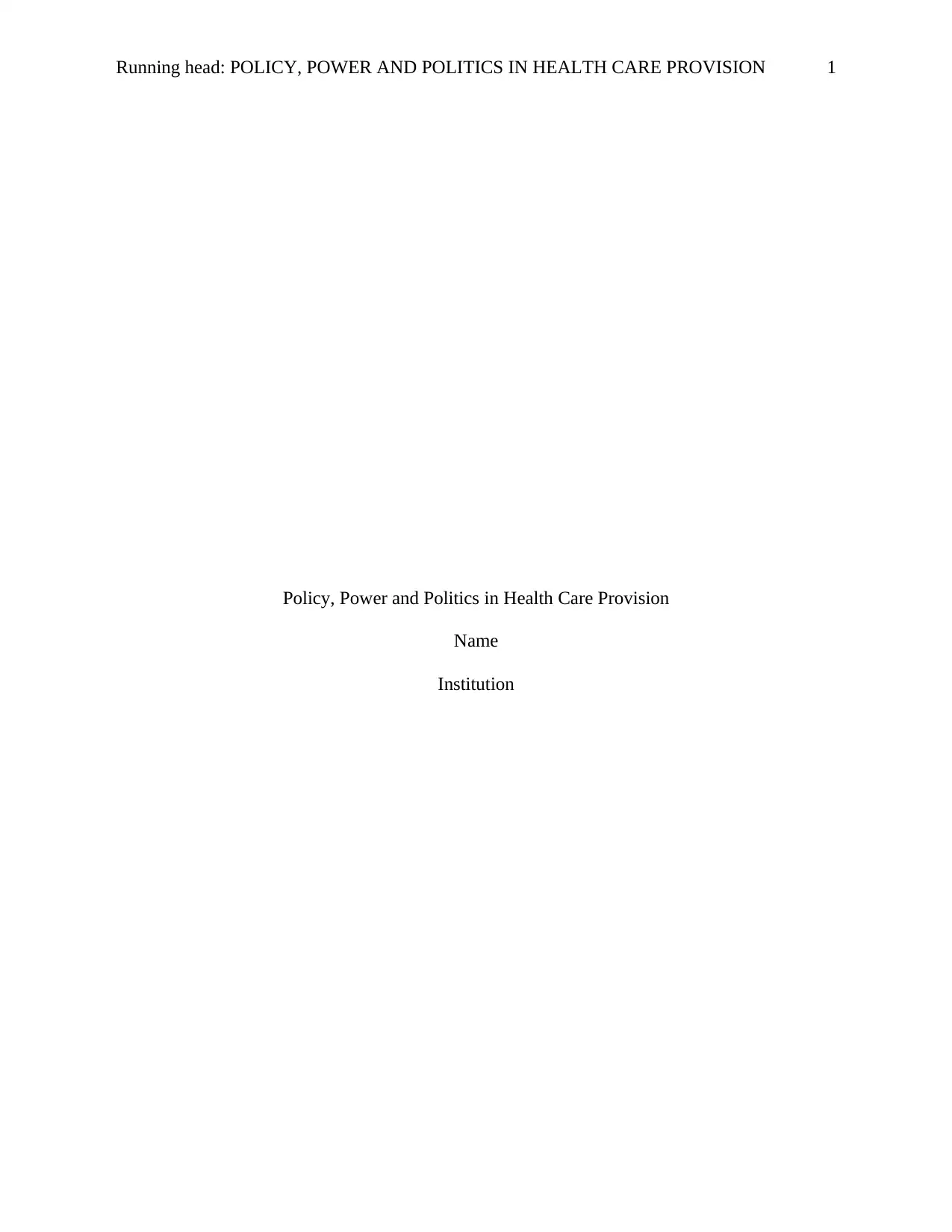
Running head: POLICY, POWER AND POLITICS IN HEALTH CARE PROVISION 1
Policy, Power and Politics in Health Care Provision
Name
Institution
Policy, Power and Politics in Health Care Provision
Name
Institution
Paraphrase This Document
Need a fresh take? Get an instant paraphrase of this document with our AI Paraphraser
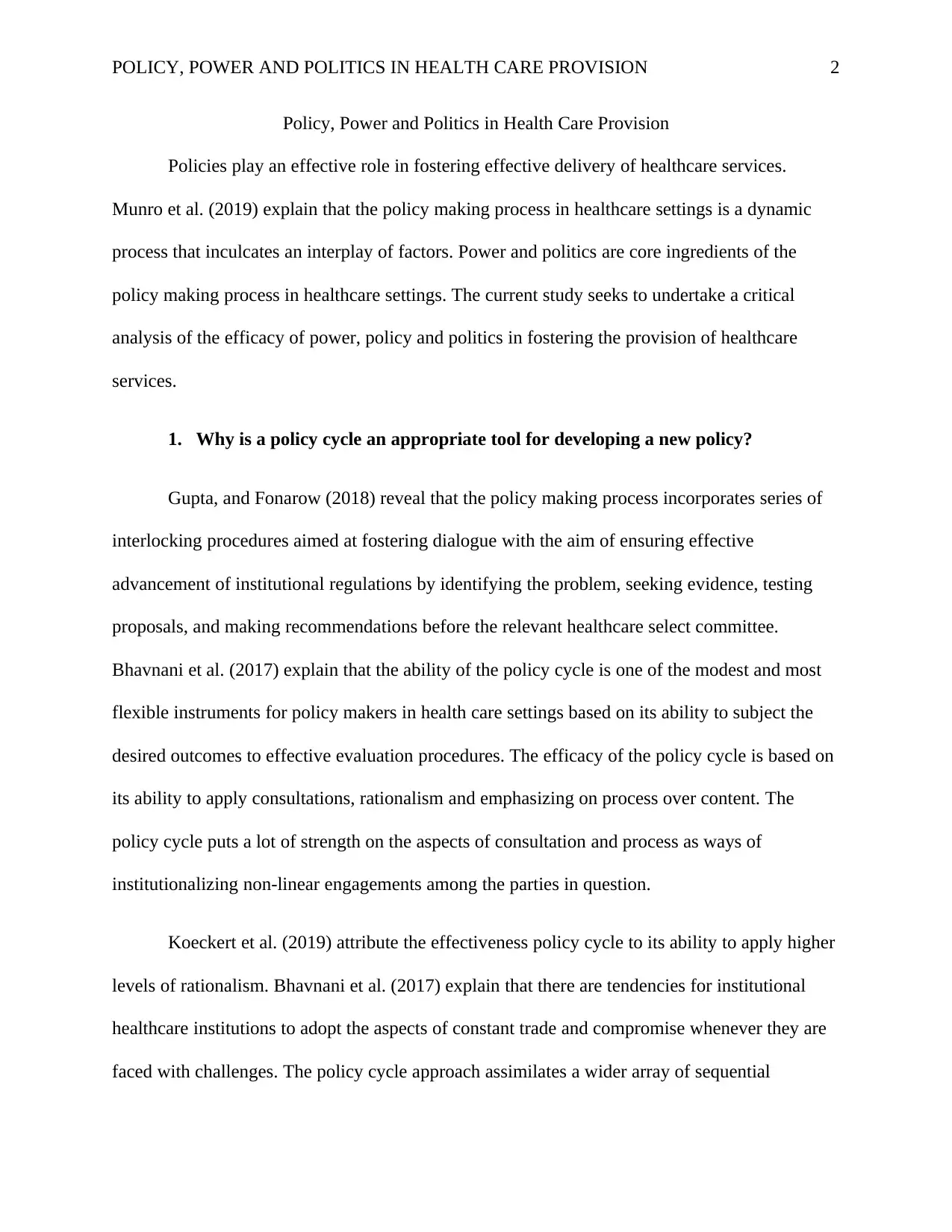
POLICY, POWER AND POLITICS IN HEALTH CARE PROVISION 2
Policy, Power and Politics in Health Care Provision
Policies play an effective role in fostering effective delivery of healthcare services.
Munro et al. (2019) explain that the policy making process in healthcare settings is a dynamic
process that inculcates an interplay of factors. Power and politics are core ingredients of the
policy making process in healthcare settings. The current study seeks to undertake a critical
analysis of the efficacy of power, policy and politics in fostering the provision of healthcare
services.
1. Why is a policy cycle an appropriate tool for developing a new policy?
Gupta, and Fonarow (2018) reveal that the policy making process incorporates series of
interlocking procedures aimed at fostering dialogue with the aim of ensuring effective
advancement of institutional regulations by identifying the problem, seeking evidence, testing
proposals, and making recommendations before the relevant healthcare select committee.
Bhavnani et al. (2017) explain that the ability of the policy cycle is one of the modest and most
flexible instruments for policy makers in health care settings based on its ability to subject the
desired outcomes to effective evaluation procedures. The efficacy of the policy cycle is based on
its ability to apply consultations, rationalism and emphasizing on process over content. The
policy cycle puts a lot of strength on the aspects of consultation and process as ways of
institutionalizing non-linear engagements among the parties in question.
Koeckert et al. (2019) attribute the effectiveness policy cycle to its ability to apply higher
levels of rationalism. Bhavnani et al. (2017) explain that there are tendencies for institutional
healthcare institutions to adopt the aspects of constant trade and compromise whenever they are
faced with challenges. The policy cycle approach assimilates a wider array of sequential
Policy, Power and Politics in Health Care Provision
Policies play an effective role in fostering effective delivery of healthcare services.
Munro et al. (2019) explain that the policy making process in healthcare settings is a dynamic
process that inculcates an interplay of factors. Power and politics are core ingredients of the
policy making process in healthcare settings. The current study seeks to undertake a critical
analysis of the efficacy of power, policy and politics in fostering the provision of healthcare
services.
1. Why is a policy cycle an appropriate tool for developing a new policy?
Gupta, and Fonarow (2018) reveal that the policy making process incorporates series of
interlocking procedures aimed at fostering dialogue with the aim of ensuring effective
advancement of institutional regulations by identifying the problem, seeking evidence, testing
proposals, and making recommendations before the relevant healthcare select committee.
Bhavnani et al. (2017) explain that the ability of the policy cycle is one of the modest and most
flexible instruments for policy makers in health care settings based on its ability to subject the
desired outcomes to effective evaluation procedures. The efficacy of the policy cycle is based on
its ability to apply consultations, rationalism and emphasizing on process over content. The
policy cycle puts a lot of strength on the aspects of consultation and process as ways of
institutionalizing non-linear engagements among the parties in question.
Koeckert et al. (2019) attribute the effectiveness policy cycle to its ability to apply higher
levels of rationalism. Bhavnani et al. (2017) explain that there are tendencies for institutional
healthcare institutions to adopt the aspects of constant trade and compromise whenever they are
faced with challenges. The policy cycle approach assimilates a wider array of sequential
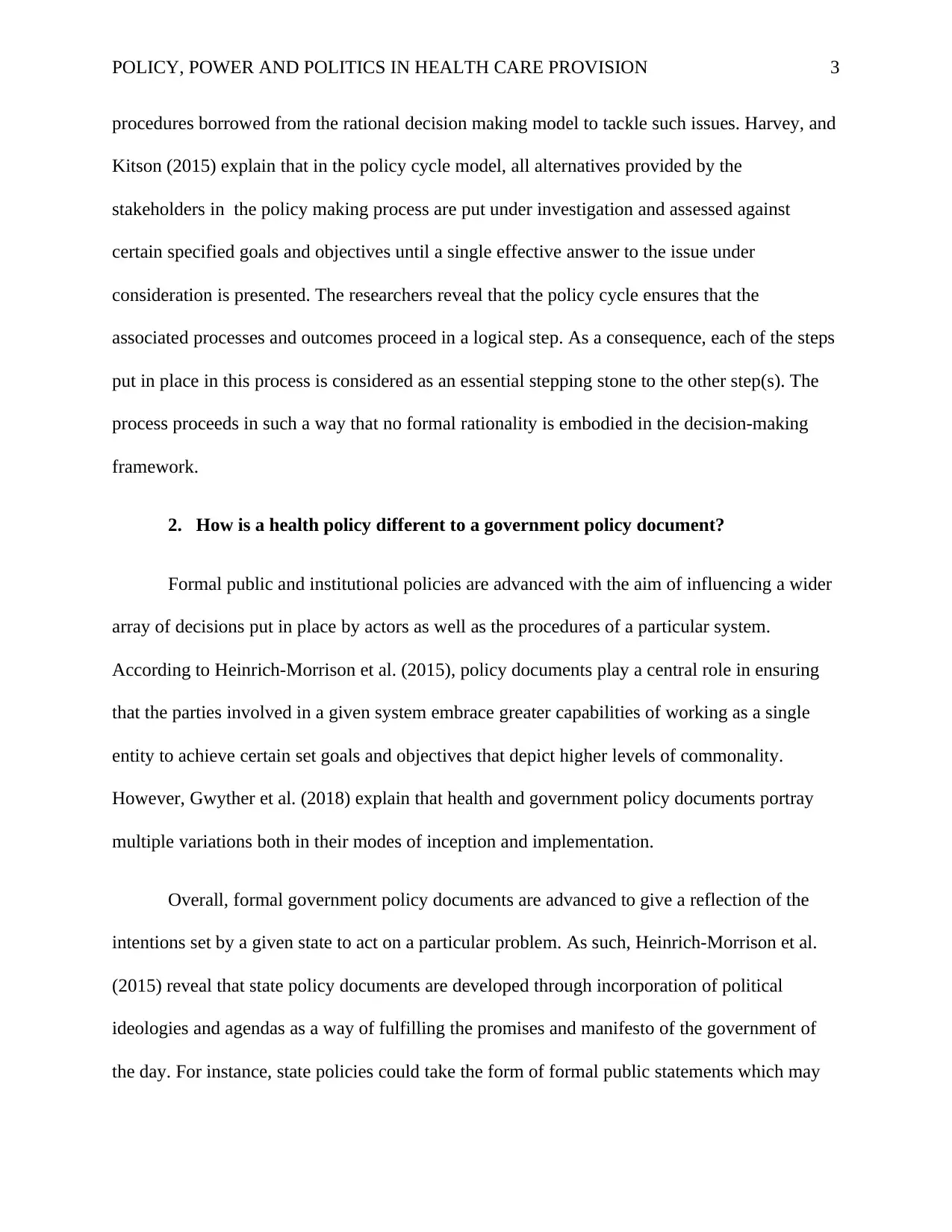
POLICY, POWER AND POLITICS IN HEALTH CARE PROVISION 3
procedures borrowed from the rational decision making model to tackle such issues. Harvey, and
Kitson (2015) explain that in the policy cycle model, all alternatives provided by the
stakeholders in the policy making process are put under investigation and assessed against
certain specified goals and objectives until a single effective answer to the issue under
consideration is presented. The researchers reveal that the policy cycle ensures that the
associated processes and outcomes proceed in a logical step. As a consequence, each of the steps
put in place in this process is considered as an essential stepping stone to the other step(s). The
process proceeds in such a way that no formal rationality is embodied in the decision-making
framework.
2. How is a health policy different to a government policy document?
Formal public and institutional policies are advanced with the aim of influencing a wider
array of decisions put in place by actors as well as the procedures of a particular system.
According to Heinrich-Morrison et al. (2015), policy documents play a central role in ensuring
that the parties involved in a given system embrace greater capabilities of working as a single
entity to achieve certain set goals and objectives that depict higher levels of commonality.
However, Gwyther et al. (2018) explain that health and government policy documents portray
multiple variations both in their modes of inception and implementation.
Overall, formal government policy documents are advanced to give a reflection of the
intentions set by a given state to act on a particular problem. As such, Heinrich-Morrison et al.
(2015) reveal that state policy documents are developed through incorporation of political
ideologies and agendas as a way of fulfilling the promises and manifesto of the government of
the day. For instance, state policies could take the form of formal public statements which may
procedures borrowed from the rational decision making model to tackle such issues. Harvey, and
Kitson (2015) explain that in the policy cycle model, all alternatives provided by the
stakeholders in the policy making process are put under investigation and assessed against
certain specified goals and objectives until a single effective answer to the issue under
consideration is presented. The researchers reveal that the policy cycle ensures that the
associated processes and outcomes proceed in a logical step. As a consequence, each of the steps
put in place in this process is considered as an essential stepping stone to the other step(s). The
process proceeds in such a way that no formal rationality is embodied in the decision-making
framework.
2. How is a health policy different to a government policy document?
Formal public and institutional policies are advanced with the aim of influencing a wider
array of decisions put in place by actors as well as the procedures of a particular system.
According to Heinrich-Morrison et al. (2015), policy documents play a central role in ensuring
that the parties involved in a given system embrace greater capabilities of working as a single
entity to achieve certain set goals and objectives that depict higher levels of commonality.
However, Gwyther et al. (2018) explain that health and government policy documents portray
multiple variations both in their modes of inception and implementation.
Overall, formal government policy documents are advanced to give a reflection of the
intentions set by a given state to act on a particular problem. As such, Heinrich-Morrison et al.
(2015) reveal that state policy documents are developed through incorporation of political
ideologies and agendas as a way of fulfilling the promises and manifesto of the government of
the day. For instance, state policies could take the form of formal public statements which may
⊘ This is a preview!⊘
Do you want full access?
Subscribe today to unlock all pages.

Trusted by 1+ million students worldwide
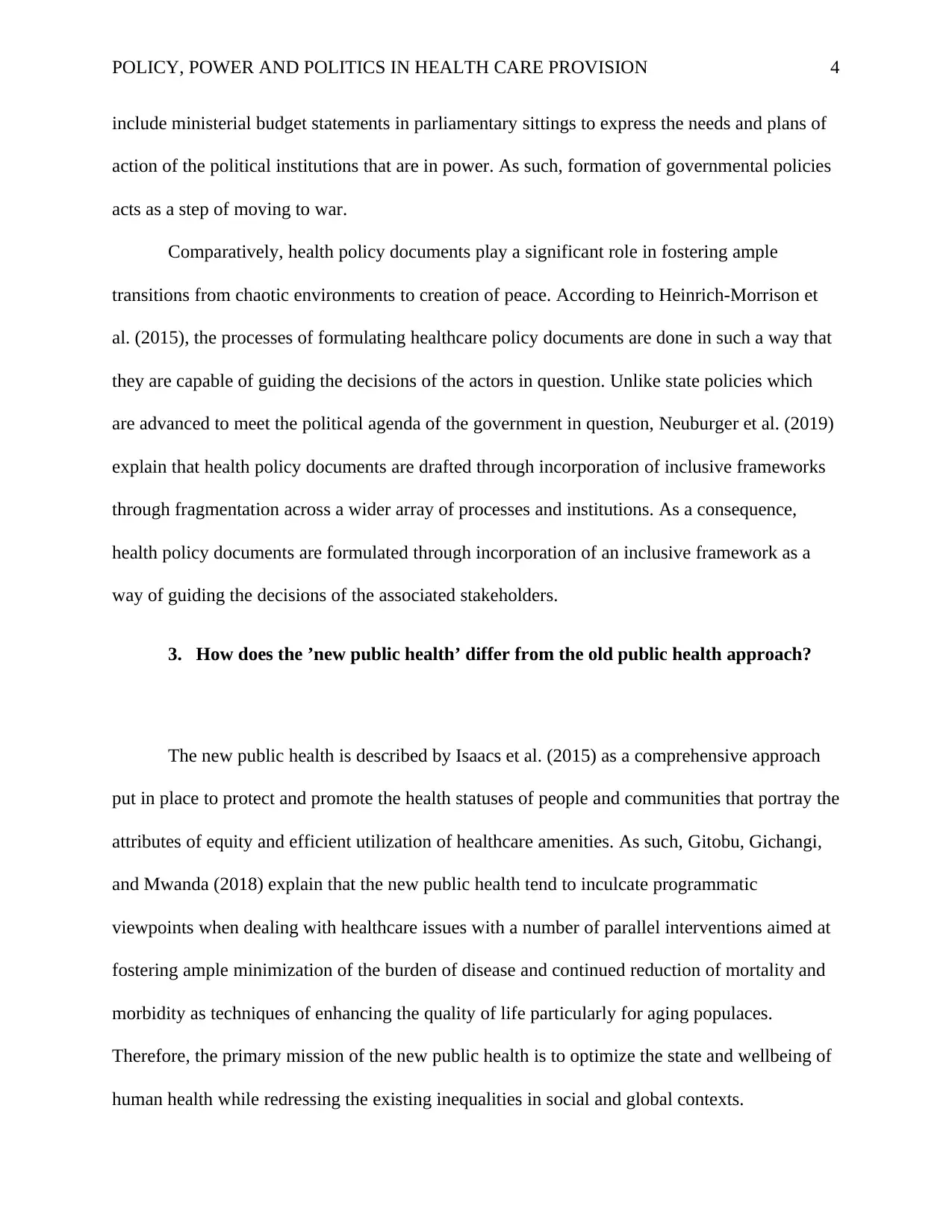
POLICY, POWER AND POLITICS IN HEALTH CARE PROVISION 4
include ministerial budget statements in parliamentary sittings to express the needs and plans of
action of the political institutions that are in power. As such, formation of governmental policies
acts as a step of moving to war.
Comparatively, health policy documents play a significant role in fostering ample
transitions from chaotic environments to creation of peace. According to Heinrich-Morrison et
al. (2015), the processes of formulating healthcare policy documents are done in such a way that
they are capable of guiding the decisions of the actors in question. Unlike state policies which
are advanced to meet the political agenda of the government in question, Neuburger et al. (2019)
explain that health policy documents are drafted through incorporation of inclusive frameworks
through fragmentation across a wider array of processes and institutions. As a consequence,
health policy documents are formulated through incorporation of an inclusive framework as a
way of guiding the decisions of the associated stakeholders.
3. How does the ’new public health’ differ from the old public health approach?
The new public health is described by Isaacs et al. (2015) as a comprehensive approach
put in place to protect and promote the health statuses of people and communities that portray the
attributes of equity and efficient utilization of healthcare amenities. As such, Gitobu, Gichangi,
and Mwanda (2018) explain that the new public health tend to inculcate programmatic
viewpoints when dealing with healthcare issues with a number of parallel interventions aimed at
fostering ample minimization of the burden of disease and continued reduction of mortality and
morbidity as techniques of enhancing the quality of life particularly for aging populaces.
Therefore, the primary mission of the new public health is to optimize the state and wellbeing of
human health while redressing the existing inequalities in social and global contexts.
include ministerial budget statements in parliamentary sittings to express the needs and plans of
action of the political institutions that are in power. As such, formation of governmental policies
acts as a step of moving to war.
Comparatively, health policy documents play a significant role in fostering ample
transitions from chaotic environments to creation of peace. According to Heinrich-Morrison et
al. (2015), the processes of formulating healthcare policy documents are done in such a way that
they are capable of guiding the decisions of the actors in question. Unlike state policies which
are advanced to meet the political agenda of the government in question, Neuburger et al. (2019)
explain that health policy documents are drafted through incorporation of inclusive frameworks
through fragmentation across a wider array of processes and institutions. As a consequence,
health policy documents are formulated through incorporation of an inclusive framework as a
way of guiding the decisions of the associated stakeholders.
3. How does the ’new public health’ differ from the old public health approach?
The new public health is described by Isaacs et al. (2015) as a comprehensive approach
put in place to protect and promote the health statuses of people and communities that portray the
attributes of equity and efficient utilization of healthcare amenities. As such, Gitobu, Gichangi,
and Mwanda (2018) explain that the new public health tend to inculcate programmatic
viewpoints when dealing with healthcare issues with a number of parallel interventions aimed at
fostering ample minimization of the burden of disease and continued reduction of mortality and
morbidity as techniques of enhancing the quality of life particularly for aging populaces.
Therefore, the primary mission of the new public health is to optimize the state and wellbeing of
human health while redressing the existing inequalities in social and global contexts.
Paraphrase This Document
Need a fresh take? Get an instant paraphrase of this document with our AI Paraphraser
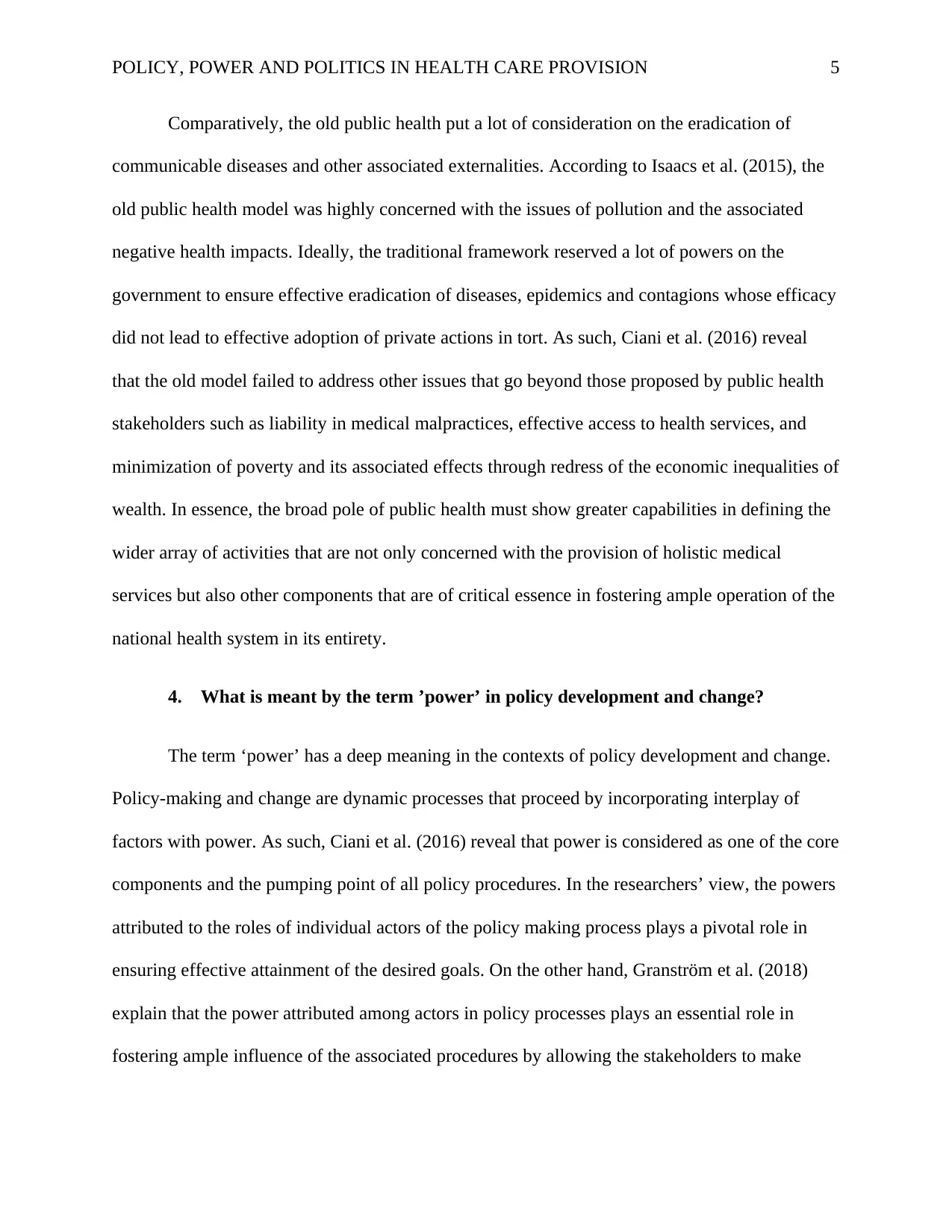
POLICY, POWER AND POLITICS IN HEALTH CARE PROVISION 5
Comparatively, the old public health put a lot of consideration on the eradication of
communicable diseases and other associated externalities. According to Isaacs et al. (2015), the
old public health model was highly concerned with the issues of pollution and the associated
negative health impacts. Ideally, the traditional framework reserved a lot of powers on the
government to ensure effective eradication of diseases, epidemics and contagions whose efficacy
did not lead to effective adoption of private actions in tort. As such, Ciani et al. (2016) reveal
that the old model failed to address other issues that go beyond those proposed by public health
stakeholders such as liability in medical malpractices, effective access to health services, and
minimization of poverty and its associated effects through redress of the economic inequalities of
wealth. In essence, the broad pole of public health must show greater capabilities in defining the
wider array of activities that are not only concerned with the provision of holistic medical
services but also other components that are of critical essence in fostering ample operation of the
national health system in its entirety.
4. What is meant by the term ’power’ in policy development and change?
The term ‘power’ has a deep meaning in the contexts of policy development and change.
Policy-making and change are dynamic processes that proceed by incorporating interplay of
factors with power. As such, Ciani et al. (2016) reveal that power is considered as one of the core
components and the pumping point of all policy procedures. In the researchers’ view, the powers
attributed to the roles of individual actors of the policy making process plays a pivotal role in
ensuring effective attainment of the desired goals. On the other hand, Granström et al. (2018)
explain that the power attributed among actors in policy processes plays an essential role in
fostering ample influence of the associated procedures by allowing the stakeholders to make
Comparatively, the old public health put a lot of consideration on the eradication of
communicable diseases and other associated externalities. According to Isaacs et al. (2015), the
old public health model was highly concerned with the issues of pollution and the associated
negative health impacts. Ideally, the traditional framework reserved a lot of powers on the
government to ensure effective eradication of diseases, epidemics and contagions whose efficacy
did not lead to effective adoption of private actions in tort. As such, Ciani et al. (2016) reveal
that the old model failed to address other issues that go beyond those proposed by public health
stakeholders such as liability in medical malpractices, effective access to health services, and
minimization of poverty and its associated effects through redress of the economic inequalities of
wealth. In essence, the broad pole of public health must show greater capabilities in defining the
wider array of activities that are not only concerned with the provision of holistic medical
services but also other components that are of critical essence in fostering ample operation of the
national health system in its entirety.
4. What is meant by the term ’power’ in policy development and change?
The term ‘power’ has a deep meaning in the contexts of policy development and change.
Policy-making and change are dynamic processes that proceed by incorporating interplay of
factors with power. As such, Ciani et al. (2016) reveal that power is considered as one of the core
components and the pumping point of all policy procedures. In the researchers’ view, the powers
attributed to the roles of individual actors of the policy making process plays a pivotal role in
ensuring effective attainment of the desired goals. On the other hand, Granström et al. (2018)
explain that the power attributed among actors in policy processes plays an essential role in
fostering ample influence of the associated procedures by allowing the stakeholders to make
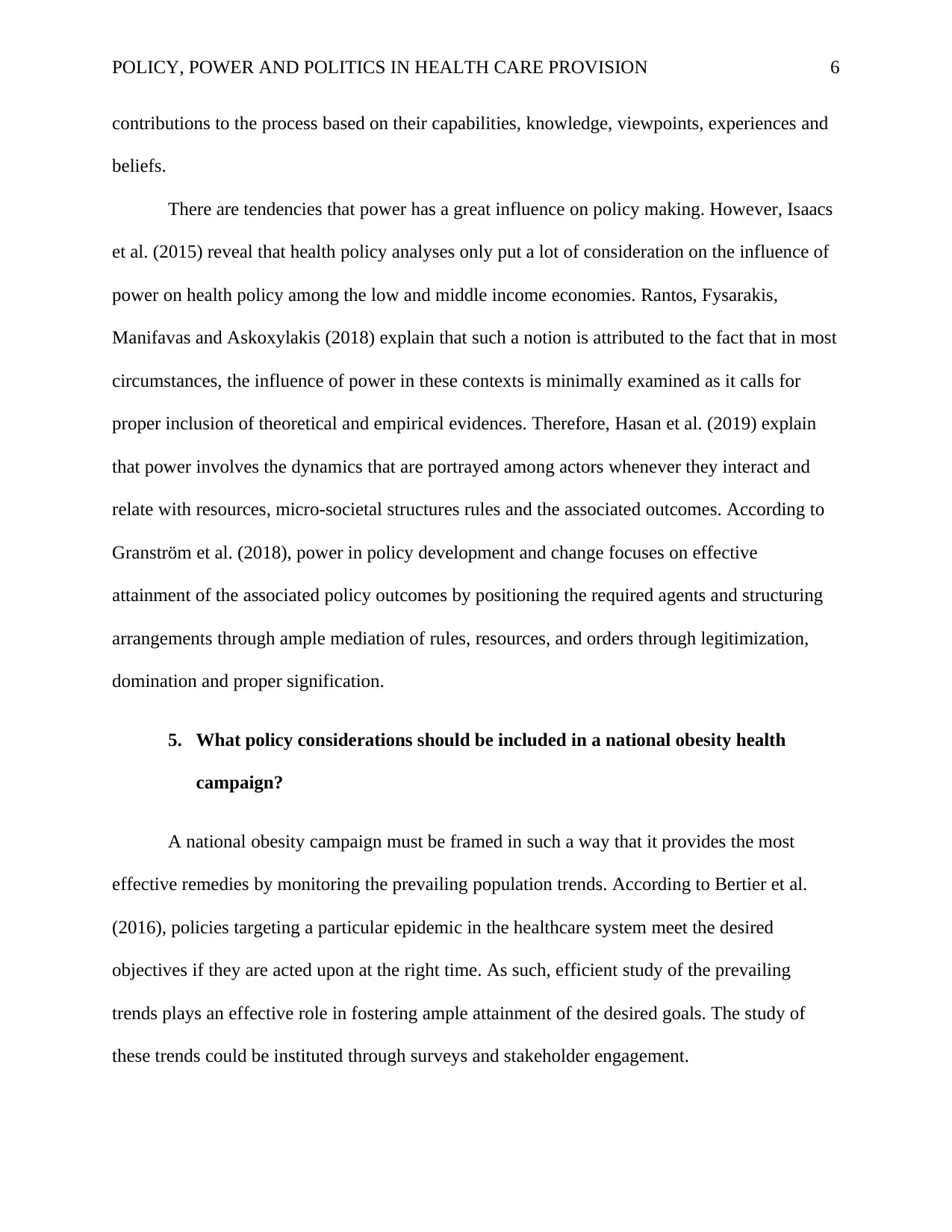
POLICY, POWER AND POLITICS IN HEALTH CARE PROVISION 6
contributions to the process based on their capabilities, knowledge, viewpoints, experiences and
beliefs.
There are tendencies that power has a great influence on policy making. However, Isaacs
et al. (2015) reveal that health policy analyses only put a lot of consideration on the influence of
power on health policy among the low and middle income economies. Rantos, Fysarakis,
Manifavas and Askoxylakis (2018) explain that such a notion is attributed to the fact that in most
circumstances, the influence of power in these contexts is minimally examined as it calls for
proper inclusion of theoretical and empirical evidences. Therefore, Hasan et al. (2019) explain
that power involves the dynamics that are portrayed among actors whenever they interact and
relate with resources, micro-societal structures rules and the associated outcomes. According to
Granström et al. (2018), power in policy development and change focuses on effective
attainment of the associated policy outcomes by positioning the required agents and structuring
arrangements through ample mediation of rules, resources, and orders through legitimization,
domination and proper signification.
5. What policy considerations should be included in a national obesity health
campaign?
A national obesity campaign must be framed in such a way that it provides the most
effective remedies by monitoring the prevailing population trends. According to Bertier et al.
(2016), policies targeting a particular epidemic in the healthcare system meet the desired
objectives if they are acted upon at the right time. As such, efficient study of the prevailing
trends plays an effective role in fostering ample attainment of the desired goals. The study of
these trends could be instituted through surveys and stakeholder engagement.
contributions to the process based on their capabilities, knowledge, viewpoints, experiences and
beliefs.
There are tendencies that power has a great influence on policy making. However, Isaacs
et al. (2015) reveal that health policy analyses only put a lot of consideration on the influence of
power on health policy among the low and middle income economies. Rantos, Fysarakis,
Manifavas and Askoxylakis (2018) explain that such a notion is attributed to the fact that in most
circumstances, the influence of power in these contexts is minimally examined as it calls for
proper inclusion of theoretical and empirical evidences. Therefore, Hasan et al. (2019) explain
that power involves the dynamics that are portrayed among actors whenever they interact and
relate with resources, micro-societal structures rules and the associated outcomes. According to
Granström et al. (2018), power in policy development and change focuses on effective
attainment of the associated policy outcomes by positioning the required agents and structuring
arrangements through ample mediation of rules, resources, and orders through legitimization,
domination and proper signification.
5. What policy considerations should be included in a national obesity health
campaign?
A national obesity campaign must be framed in such a way that it provides the most
effective remedies by monitoring the prevailing population trends. According to Bertier et al.
(2016), policies targeting a particular epidemic in the healthcare system meet the desired
objectives if they are acted upon at the right time. As such, efficient study of the prevailing
trends plays an effective role in fostering ample attainment of the desired goals. The study of
these trends could be instituted through surveys and stakeholder engagement.
⊘ This is a preview!⊘
Do you want full access?
Subscribe today to unlock all pages.

Trusted by 1+ million students worldwide
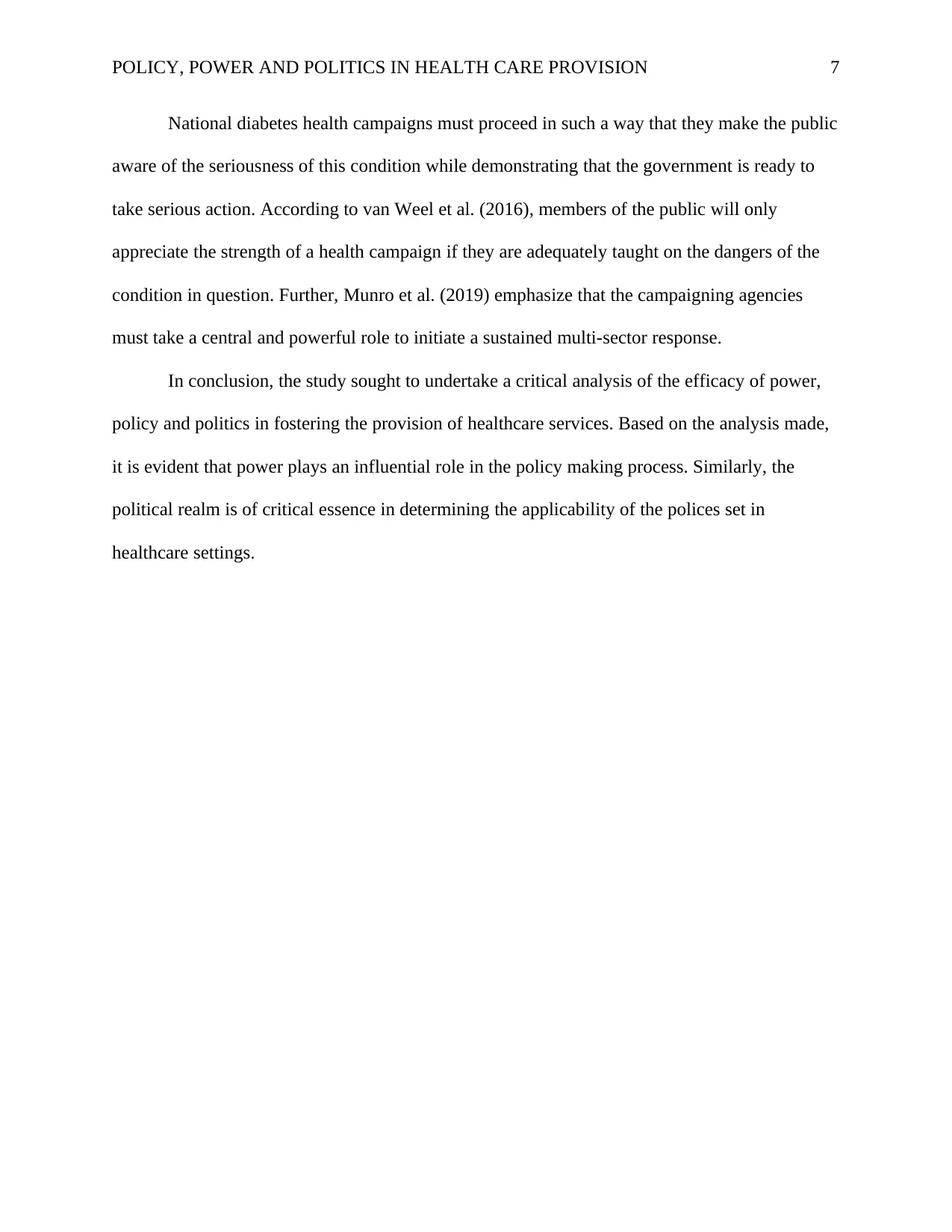
POLICY, POWER AND POLITICS IN HEALTH CARE PROVISION 7
National diabetes health campaigns must proceed in such a way that they make the public
aware of the seriousness of this condition while demonstrating that the government is ready to
take serious action. According to van Weel et al. (2016), members of the public will only
appreciate the strength of a health campaign if they are adequately taught on the dangers of the
condition in question. Further, Munro et al. (2019) emphasize that the campaigning agencies
must take a central and powerful role to initiate a sustained multi-sector response.
In conclusion, the study sought to undertake a critical analysis of the efficacy of power,
policy and politics in fostering the provision of healthcare services. Based on the analysis made,
it is evident that power plays an influential role in the policy making process. Similarly, the
political realm is of critical essence in determining the applicability of the polices set in
healthcare settings.
National diabetes health campaigns must proceed in such a way that they make the public
aware of the seriousness of this condition while demonstrating that the government is ready to
take serious action. According to van Weel et al. (2016), members of the public will only
appreciate the strength of a health campaign if they are adequately taught on the dangers of the
condition in question. Further, Munro et al. (2019) emphasize that the campaigning agencies
must take a central and powerful role to initiate a sustained multi-sector response.
In conclusion, the study sought to undertake a critical analysis of the efficacy of power,
policy and politics in fostering the provision of healthcare services. Based on the analysis made,
it is evident that power plays an influential role in the policy making process. Similarly, the
political realm is of critical essence in determining the applicability of the polices set in
healthcare settings.
Paraphrase This Document
Need a fresh take? Get an instant paraphrase of this document with our AI Paraphraser
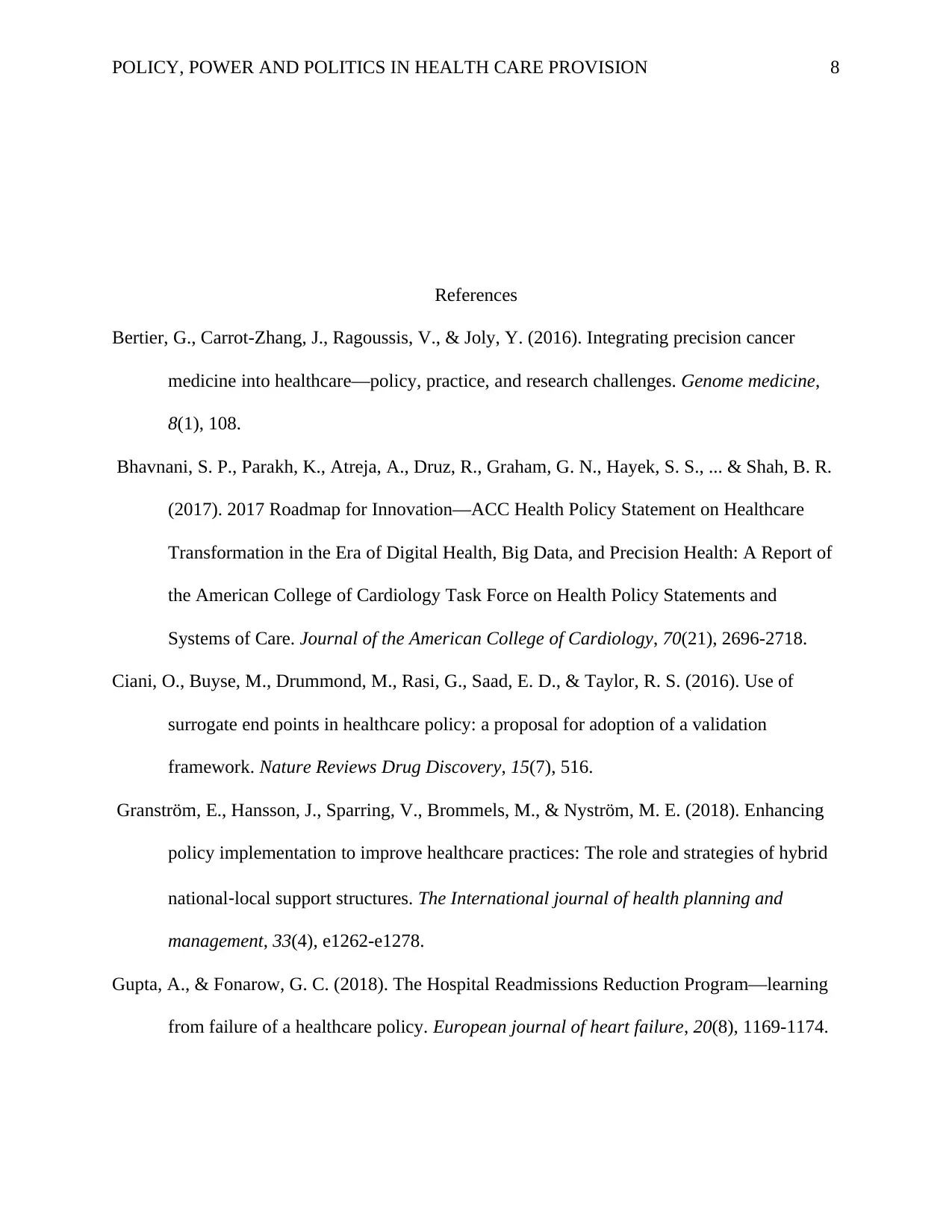
POLICY, POWER AND POLITICS IN HEALTH CARE PROVISION 8
References
Bertier, G., Carrot-Zhang, J., Ragoussis, V., & Joly, Y. (2016). Integrating precision cancer
medicine into healthcare—policy, practice, and research challenges. Genome medicine,
8(1), 108.
Bhavnani, S. P., Parakh, K., Atreja, A., Druz, R., Graham, G. N., Hayek, S. S., ... & Shah, B. R.
(2017). 2017 Roadmap for Innovation—ACC Health Policy Statement on Healthcare
Transformation in the Era of Digital Health, Big Data, and Precision Health: A Report of
the American College of Cardiology Task Force on Health Policy Statements and
Systems of Care. Journal of the American College of Cardiology, 70(21), 2696-2718.
Ciani, O., Buyse, M., Drummond, M., Rasi, G., Saad, E. D., & Taylor, R. S. (2016). Use of
surrogate end points in healthcare policy: a proposal for adoption of a validation
framework. Nature Reviews Drug Discovery, 15(7), 516.
Granström, E., Hansson, J., Sparring, V., Brommels, M., & Nyström, M. E. (2018). Enhancing
policy implementation to improve healthcare practices: The role and strategies of hybrid
national‐local support structures. The International journal of health planning and
management, 33(4), e1262-e1278.
Gupta, A., & Fonarow, G. C. (2018). The Hospital Readmissions Reduction Program—learning
from failure of a healthcare policy. European journal of heart failure, 20(8), 1169-1174.
References
Bertier, G., Carrot-Zhang, J., Ragoussis, V., & Joly, Y. (2016). Integrating precision cancer
medicine into healthcare—policy, practice, and research challenges. Genome medicine,
8(1), 108.
Bhavnani, S. P., Parakh, K., Atreja, A., Druz, R., Graham, G. N., Hayek, S. S., ... & Shah, B. R.
(2017). 2017 Roadmap for Innovation—ACC Health Policy Statement on Healthcare
Transformation in the Era of Digital Health, Big Data, and Precision Health: A Report of
the American College of Cardiology Task Force on Health Policy Statements and
Systems of Care. Journal of the American College of Cardiology, 70(21), 2696-2718.
Ciani, O., Buyse, M., Drummond, M., Rasi, G., Saad, E. D., & Taylor, R. S. (2016). Use of
surrogate end points in healthcare policy: a proposal for adoption of a validation
framework. Nature Reviews Drug Discovery, 15(7), 516.
Granström, E., Hansson, J., Sparring, V., Brommels, M., & Nyström, M. E. (2018). Enhancing
policy implementation to improve healthcare practices: The role and strategies of hybrid
national‐local support structures. The International journal of health planning and
management, 33(4), e1262-e1278.
Gupta, A., & Fonarow, G. C. (2018). The Hospital Readmissions Reduction Program—learning
from failure of a healthcare policy. European journal of heart failure, 20(8), 1169-1174.
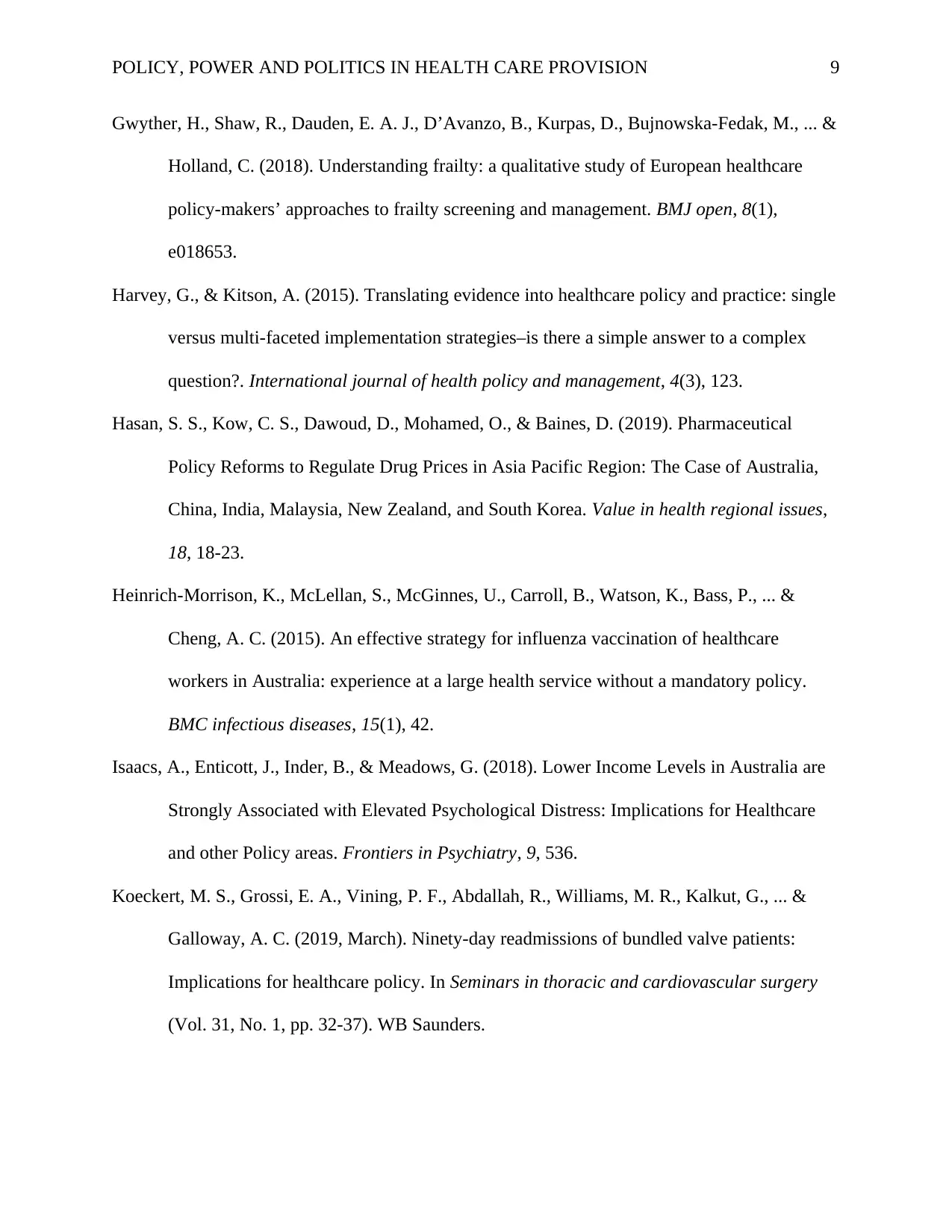
POLICY, POWER AND POLITICS IN HEALTH CARE PROVISION 9
Gwyther, H., Shaw, R., Dauden, E. A. J., D’Avanzo, B., Kurpas, D., Bujnowska-Fedak, M., ... &
Holland, C. (2018). Understanding frailty: a qualitative study of European healthcare
policy-makers’ approaches to frailty screening and management. BMJ open, 8(1),
e018653.
Harvey, G., & Kitson, A. (2015). Translating evidence into healthcare policy and practice: single
versus multi-faceted implementation strategies–is there a simple answer to a complex
question?. International journal of health policy and management, 4(3), 123.
Hasan, S. S., Kow, C. S., Dawoud, D., Mohamed, O., & Baines, D. (2019). Pharmaceutical
Policy Reforms to Regulate Drug Prices in Asia Pacific Region: The Case of Australia,
China, India, Malaysia, New Zealand, and South Korea. Value in health regional issues,
18, 18-23.
Heinrich-Morrison, K., McLellan, S., McGinnes, U., Carroll, B., Watson, K., Bass, P., ... &
Cheng, A. C. (2015). An effective strategy for influenza vaccination of healthcare
workers in Australia: experience at a large health service without a mandatory policy.
BMC infectious diseases, 15(1), 42.
Isaacs, A., Enticott, J., Inder, B., & Meadows, G. (2018). Lower Income Levels in Australia are
Strongly Associated with Elevated Psychological Distress: Implications for Healthcare
and other Policy areas. Frontiers in Psychiatry, 9, 536.
Koeckert, M. S., Grossi, E. A., Vining, P. F., Abdallah, R., Williams, M. R., Kalkut, G., ... &
Galloway, A. C. (2019, March). Ninety-day readmissions of bundled valve patients:
Implications for healthcare policy. In Seminars in thoracic and cardiovascular surgery
(Vol. 31, No. 1, pp. 32-37). WB Saunders.
Gwyther, H., Shaw, R., Dauden, E. A. J., D’Avanzo, B., Kurpas, D., Bujnowska-Fedak, M., ... &
Holland, C. (2018). Understanding frailty: a qualitative study of European healthcare
policy-makers’ approaches to frailty screening and management. BMJ open, 8(1),
e018653.
Harvey, G., & Kitson, A. (2015). Translating evidence into healthcare policy and practice: single
versus multi-faceted implementation strategies–is there a simple answer to a complex
question?. International journal of health policy and management, 4(3), 123.
Hasan, S. S., Kow, C. S., Dawoud, D., Mohamed, O., & Baines, D. (2019). Pharmaceutical
Policy Reforms to Regulate Drug Prices in Asia Pacific Region: The Case of Australia,
China, India, Malaysia, New Zealand, and South Korea. Value in health regional issues,
18, 18-23.
Heinrich-Morrison, K., McLellan, S., McGinnes, U., Carroll, B., Watson, K., Bass, P., ... &
Cheng, A. C. (2015). An effective strategy for influenza vaccination of healthcare
workers in Australia: experience at a large health service without a mandatory policy.
BMC infectious diseases, 15(1), 42.
Isaacs, A., Enticott, J., Inder, B., & Meadows, G. (2018). Lower Income Levels in Australia are
Strongly Associated with Elevated Psychological Distress: Implications for Healthcare
and other Policy areas. Frontiers in Psychiatry, 9, 536.
Koeckert, M. S., Grossi, E. A., Vining, P. F., Abdallah, R., Williams, M. R., Kalkut, G., ... &
Galloway, A. C. (2019, March). Ninety-day readmissions of bundled valve patients:
Implications for healthcare policy. In Seminars in thoracic and cardiovascular surgery
(Vol. 31, No. 1, pp. 32-37). WB Saunders.
⊘ This is a preview!⊘
Do you want full access?
Subscribe today to unlock all pages.

Trusted by 1+ million students worldwide
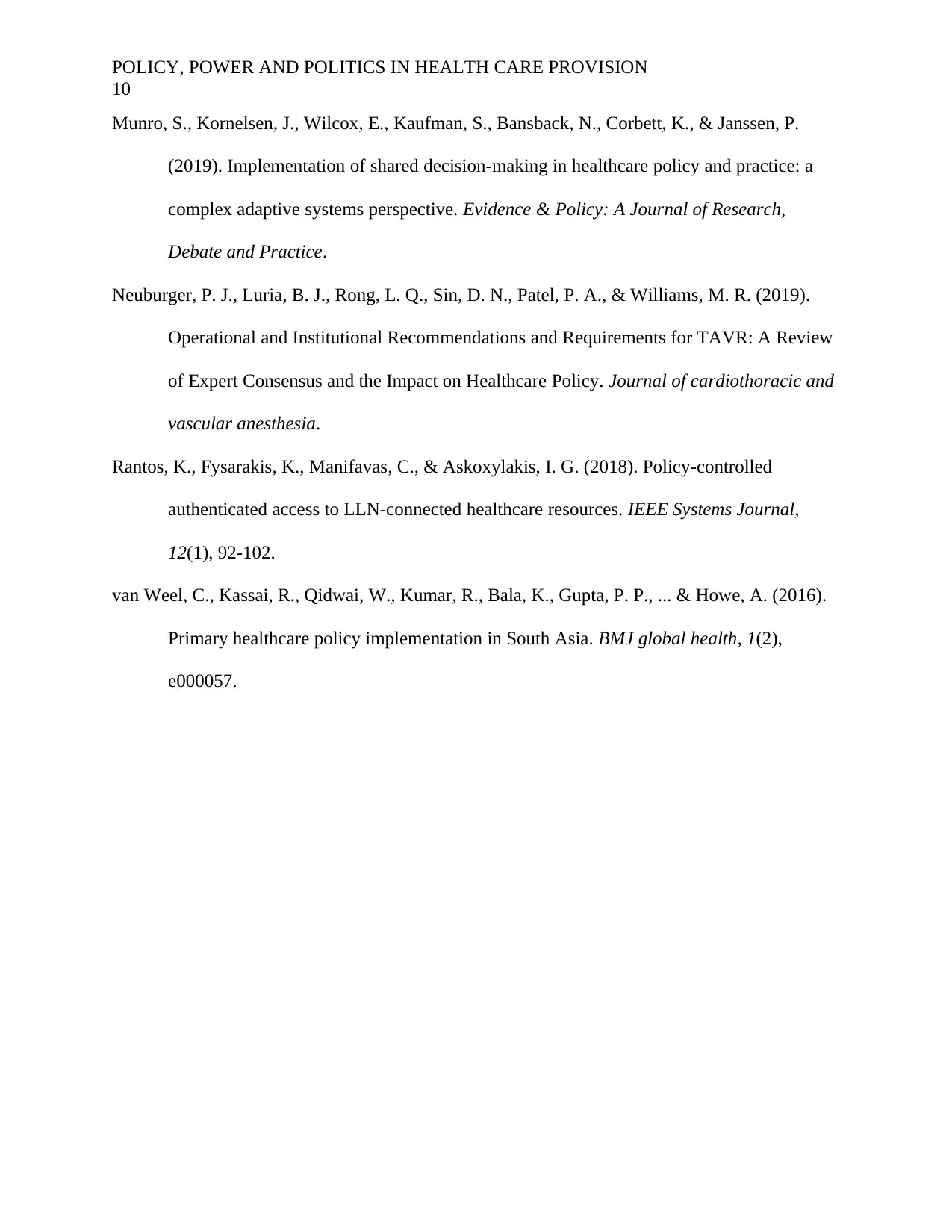
POLICY, POWER AND POLITICS IN HEALTH CARE PROVISION
10
Munro, S., Kornelsen, J., Wilcox, E., Kaufman, S., Bansback, N., Corbett, K., & Janssen, P.
(2019). Implementation of shared decision-making in healthcare policy and practice: a
complex adaptive systems perspective. Evidence & Policy: A Journal of Research,
Debate and Practice.
Neuburger, P. J., Luria, B. J., Rong, L. Q., Sin, D. N., Patel, P. A., & Williams, M. R. (2019).
Operational and Institutional Recommendations and Requirements for TAVR: A Review
of Expert Consensus and the Impact on Healthcare Policy. Journal of cardiothoracic and
vascular anesthesia.
Rantos, K., Fysarakis, K., Manifavas, C., & Askoxylakis, I. G. (2018). Policy-controlled
authenticated access to LLN-connected healthcare resources. IEEE Systems Journal,
12(1), 92-102.
van Weel, C., Kassai, R., Qidwai, W., Kumar, R., Bala, K., Gupta, P. P., ... & Howe, A. (2016).
Primary healthcare policy implementation in South Asia. BMJ global health, 1(2),
e000057.
10
Munro, S., Kornelsen, J., Wilcox, E., Kaufman, S., Bansback, N., Corbett, K., & Janssen, P.
(2019). Implementation of shared decision-making in healthcare policy and practice: a
complex adaptive systems perspective. Evidence & Policy: A Journal of Research,
Debate and Practice.
Neuburger, P. J., Luria, B. J., Rong, L. Q., Sin, D. N., Patel, P. A., & Williams, M. R. (2019).
Operational and Institutional Recommendations and Requirements for TAVR: A Review
of Expert Consensus and the Impact on Healthcare Policy. Journal of cardiothoracic and
vascular anesthesia.
Rantos, K., Fysarakis, K., Manifavas, C., & Askoxylakis, I. G. (2018). Policy-controlled
authenticated access to LLN-connected healthcare resources. IEEE Systems Journal,
12(1), 92-102.
van Weel, C., Kassai, R., Qidwai, W., Kumar, R., Bala, K., Gupta, P. P., ... & Howe, A. (2016).
Primary healthcare policy implementation in South Asia. BMJ global health, 1(2),
e000057.
1 out of 10
Related Documents
Your All-in-One AI-Powered Toolkit for Academic Success.
+13062052269
info@desklib.com
Available 24*7 on WhatsApp / Email
![[object Object]](/_next/static/media/star-bottom.7253800d.svg)
Unlock your academic potential
Copyright © 2020–2026 A2Z Services. All Rights Reserved. Developed and managed by ZUCOL.




